Denmark is full of opportunities for people of all ages. The country has a sound healthcare system and excellent education. Bustling cities and thriving industries make Denmark the perfect place for anyone to immigrate to. Not to mention the EU benefits you’d get after you gain residency and the superior work-life balance that Denmark offers.
However, there’s more to moving to Denmark than just catching a plane and settling there. Don’t worry, though; we’re here with a guide dedicated to helping you relocate to Denmark.
The Basics
The basics you need to know about include work permits, housing, and educational opportunities. Work permits, living permits, and entry are all included in the Danish visa. For residents of EU countries, the relocation process is quite literally hassle-free. As a non-EU citizen, you just need to apply for a visa if you’re hoping to move to Denmark.
Applying for a Danish visa usually costs around $80. Unlike other developed nations, the visa process doesn’t take long and will get processed within a few weeks. Having a job contract definitely helps in getting your visa application approved.
Housing in Denmark
Now that you’ve got the permits covered, and you’re all set to move, the next step is looking for a residence. Accommodation isn’t exactly cheap in Denmark, and you’re at an even bigger disadvantage as an expat. For example, accommodation for one person may cost up to 8,800 DKK (1,300 USD) and even higher in metropolitan cities.
On the other hand, buying a house is even more challenging because current Denmark has higher real estate prices than ever before. As a foreigner, you’re also less likely to get a deal on the mortgage.
Education in Denmark
Primary schooling is compulsory in Denmark, with the option of an extra, optional year of study. However, since everyone opts for it, it’s become the norm.
Education in Denmark is an easy affair, to say the least. Public universities in Denmark are free of cost for residents. This means that if you wish to get a higher education, all you need to do is pass the entry test or meet the college’s admissions requirement.
Healthcare
If you’re from the United States, you probably know that it can be crazy expensive to get quality healthcare. Fortunately, that’s not the case in Denmark, which is famous for its competent healthcare system. Denmark is a welfare state, meaning healthcare is free of cost to all residents unless you opt for a private institution.
The Danish public health care system holds all your medical history in the cloud so that it can be accessed from everywhere. If you’ve got a baby on the way and were wondering about the difficulties of childbirth, don’t be! Danish hospitals have some of the most well-trained midwives and doctors in the world.
Non-emergency surgeries or treatment may require some waiting time and have you backtracked. Don’t sweat it though; you can always opt for the private sector if you’re in a hurry. It’s definitely more expensive, but you won’t have to wait as long.
Work On Your Language
This one is kind of important, so read it carefully. You need to work on your Danish language skills. Most jobs in Denmark will require fluency in the language, and many jobs in sales or marketing will also require that you at least have a strong grip on the language.
Being fluent in English just isn’t enough for Danish society since most people living in Denmark are already quite fluent in English.
Sort Out Employment
If you have a grip on the language, you can get a job in no time. Denmark’s working conditions are ideal with 37 hour weeks and an average salary of 47,000 DKK a month. Keep in mind that almost half of this will go towards tax. Think of it this way; you don’t have to pay for education or healthcare, so technically, you’re getting the best of both worlds.
If you’re not very fluent in the Danish language, your career choices tend to get limited. Jobs in technical fields that don’t require public interaction may suit you. However, learning a language can give you an edge. There are plenty of adult learning centers all across the country, along with many other online/remote alternatives like Duolingo or Babbel.
Financial Framework
Opening up a bank account in Denmark is no rocket science, all you need to do is walk over to your nearest bank and fill out a form. The only real requirement is a CPR number (your national identity number). Hence, if you’re not a citizen, there is little chance that you can open a bank account in Denmark.
Along with this, banks will ask for your proof of income, proof of address, and photo ID. If you had a bank account in your previous country with branches operating in Denmark, you could simply get your account transferred.
No matter how many accounts you have, you should always state your most-used account as your Nem Kanto. This will be the bank account the government will use to deposit any money that you may be entitled to according to law.
Some last words…
This is it, all that you need to know about relocating to Denmark. We hope that this small guide may ease your immigration. Wishing you a happy relocation. How did you like this blog? Did we miss something? Let us know in the comments down below.
